When I was a child, I remember being distinctly disappointed with the power-levels of the average wizard in fiction. It’s possible that’s because the first memory I have of a story where someone lobbed around spells and curses was Maleficent from Disney’s Sleeping Beauty. If wizards weren’t changing themselves into dragons, well really, what good were they?
Even most of the villainous wizards were usually hamstrung in some manner to explain why they didn’t automatically win against the heroes. (I mean seriously, Saruman was clearly breaking the rules binding the Istari and yet his greatest power was the Industrial Revolution.) The good wizards? Instead of being forces of nature, most of them were advisers whose main job was to cajole, point, or trick the hero into going on the quest (looking at you, Merlin, Gandalf, and Dumbledore). This inevitably resulted in nine-year-old me jumping up and down while screaming, “Really, Glinda? Dorothy had the power to go home THIS WHOLE TIME? Whose side are you ON?”
So, this list isn’t going to include those books.
No, instead I’m going to talk about my five favorite books (or series) with wizards, witches, and sorcerers who were not at all squeamish about opening a magical can of ungodly power on their enemies, deities, and the whole world, not necessarily in that order.
The Broken Earth Trilogy by N.K. Jemisin
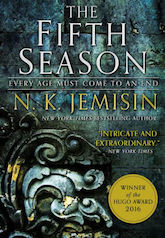 Now one might argue that the Orogenes of N.K. Jemison’s books aren’t wizards, but to my mind the fact that they have a reasonably narrow field of specialty shouldn’t disqualify them. After all, one of them is powerful enough to break a continental plate straight down the middle. Likewise, the idea of moving entire planetary bodies using magic is a core conceit of the trilogy. These are wizards so powerful that they can (and do!) cause extinction events. I’d say that counts. This story of deeply broken people trying to survive in a deeply broken world is one of the most amazing I’ve encountered in years and deserves every single one of the many awards it’s won along the way. Start reading the trilogy for the disaster porn, keep reading it for the sublime world building and extraordinary emotional climax.
Now one might argue that the Orogenes of N.K. Jemison’s books aren’t wizards, but to my mind the fact that they have a reasonably narrow field of specialty shouldn’t disqualify them. After all, one of them is powerful enough to break a continental plate straight down the middle. Likewise, the idea of moving entire planetary bodies using magic is a core conceit of the trilogy. These are wizards so powerful that they can (and do!) cause extinction events. I’d say that counts. This story of deeply broken people trying to survive in a deeply broken world is one of the most amazing I’ve encountered in years and deserves every single one of the many awards it’s won along the way. Start reading the trilogy for the disaster porn, keep reading it for the sublime world building and extraordinary emotional climax.
The Black Company by Glen Cook
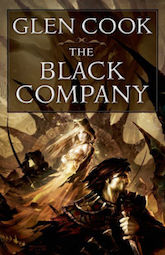 This take on a mercenary company caught in the crossfire of a rebellion against an evil god-like sorceress was my introduction to grimdark fantasy. I was blown away by Cook’s descriptions of wizards so powerful they were immortal and all but unkillable, in a world where everyone was interesting but nobody was good. I was equally impressed by the sorcerous women, every bit as terrifying as the men; women who didn’t depend on feminine whiles or seduction (although yes, the Lady is beautiful and in later books there is a romance sub-plot) but preferred to magically annihilate anyone who got in their way. This tale of soldiers desperately trying to hang on to what little humanity they still possess remains one of my all-time favorites. (I’m extremely excited to hear that Cook has a new Black Company book—Port of Shadows—coming out in September.)
This take on a mercenary company caught in the crossfire of a rebellion against an evil god-like sorceress was my introduction to grimdark fantasy. I was blown away by Cook’s descriptions of wizards so powerful they were immortal and all but unkillable, in a world where everyone was interesting but nobody was good. I was equally impressed by the sorcerous women, every bit as terrifying as the men; women who didn’t depend on feminine whiles or seduction (although yes, the Lady is beautiful and in later books there is a romance sub-plot) but preferred to magically annihilate anyone who got in their way. This tale of soldiers desperately trying to hang on to what little humanity they still possess remains one of my all-time favorites. (I’m extremely excited to hear that Cook has a new Black Company book—Port of Shadows—coming out in September.)
The Craft Sequence by Max Gladstone
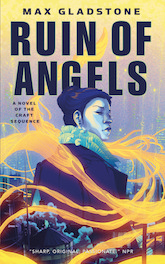 Lots of people have written about wizards, but Gladstone was the first I ever saw combine them with the true movers and shakers of the modern world: lawyers. In the Craft universe, wizards attorneys are so powerful that they have overthrown or enslaved gods. Lichdom is so assumed as a career-goal that how-to-adjust-to-your-new-undead-life classes are part of any respectable law office’s employee benefits package. The main protagonists themselves may or may not be wizards, but to my mind Elayne Keverian (senior attorney at Kelethres, Albrecht, and Ao) and Kopil, the King in Red (who rules a city-state that technically isn’t Los Angeles but certainly feels like Los Angeles), have earned their place among the greats. Added bonus: Gladstone writes all his characters, even the minor ones, with extraordinary compassion and dignity, which makes for nail-biting reading when their goals are at odds with each other (which happens fairly often).
Lots of people have written about wizards, but Gladstone was the first I ever saw combine them with the true movers and shakers of the modern world: lawyers. In the Craft universe, wizards attorneys are so powerful that they have overthrown or enslaved gods. Lichdom is so assumed as a career-goal that how-to-adjust-to-your-new-undead-life classes are part of any respectable law office’s employee benefits package. The main protagonists themselves may or may not be wizards, but to my mind Elayne Keverian (senior attorney at Kelethres, Albrecht, and Ao) and Kopil, the King in Red (who rules a city-state that technically isn’t Los Angeles but certainly feels like Los Angeles), have earned their place among the greats. Added bonus: Gladstone writes all his characters, even the minor ones, with extraordinary compassion and dignity, which makes for nail-biting reading when their goals are at odds with each other (which happens fairly often).
The Chronicles of Amber by Roger Zelazny
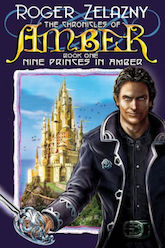 I feel sad whenever I meet someone who hasn’t read Roger Zelazny, which unfortunately happens more and more often these days. The Chronicles of Amber (the first five books in particular) were a revelation for me growing up. Now I fully acknowledge that Zelazny’s works were far from perfect: quite a few of his female characters were interchangeable with a sexy lamp and people of color were entirely absent in most of his stories. Yet it’s hard not to love his brilliant, biting prose, and I’m of the opinion that Zelazny’s redemption arc of Corwin, a dimension-striding prince who gradually begins to question his need for revenge (and the cost of that revenge), remains a masterpiece. And powerful wizards? Oh yeah. The family redheads (Fiona, Bleys, and Brand) are especially mighty but special shout-outs are due the two wizards who create entire multiverses at various points: Dworkin and Corwin himself.
I feel sad whenever I meet someone who hasn’t read Roger Zelazny, which unfortunately happens more and more often these days. The Chronicles of Amber (the first five books in particular) were a revelation for me growing up. Now I fully acknowledge that Zelazny’s works were far from perfect: quite a few of his female characters were interchangeable with a sexy lamp and people of color were entirely absent in most of his stories. Yet it’s hard not to love his brilliant, biting prose, and I’m of the opinion that Zelazny’s redemption arc of Corwin, a dimension-striding prince who gradually begins to question his need for revenge (and the cost of that revenge), remains a masterpiece. And powerful wizards? Oh yeah. The family redheads (Fiona, Bleys, and Brand) are especially mighty but special shout-outs are due the two wizards who create entire multiverses at various points: Dworkin and Corwin himself.
Howl’s Moving Castle by Diana Wynne Jones
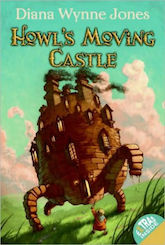 Truthfully you could grab almost any book by Diana Wynne Jones and probably end up with a handful of screamingly powerful (if whimsical) wizards. However, Howl’s Moving Castle (which later found a wider audience as a Hayao Miyazaki animated film), with its story of Sophie, a young hatmaker’s daughter who is cursed to be an old woman, remains my favorite. The titular Howl, along with such worthies as the Witch of the Wastes and Sophie herself, think nothing of crafting some truly awesome spells, curses, and gates between cities, countries, and indeed entire dimensions (including ours). Howl’s universe is one where you’ll have no trouble at all believing that there’s little a wizard can’t do – except keep a clean house (oh, how I relate to that one). If you loved the movie, I recommend picking up the book, since Miyazaki changed the story in several significant ways (both versions are lovely). One thing is certain: movie or book, Calcifer is the most adorable fire demon ever.
Truthfully you could grab almost any book by Diana Wynne Jones and probably end up with a handful of screamingly powerful (if whimsical) wizards. However, Howl’s Moving Castle (which later found a wider audience as a Hayao Miyazaki animated film), with its story of Sophie, a young hatmaker’s daughter who is cursed to be an old woman, remains my favorite. The titular Howl, along with such worthies as the Witch of the Wastes and Sophie herself, think nothing of crafting some truly awesome spells, curses, and gates between cities, countries, and indeed entire dimensions (including ours). Howl’s universe is one where you’ll have no trouble at all believing that there’s little a wizard can’t do – except keep a clean house (oh, how I relate to that one). If you loved the movie, I recommend picking up the book, since Miyazaki changed the story in several significant ways (both versions are lovely). One thing is certain: movie or book, Calcifer is the most adorable fire demon ever.
So, there you have it. My five favorites, not necessarily the ones that usually make these lists (current-me doesn’t understand fifteen-year-old-me’s obsession with Raistlin), but definitely ones that are, in my opinion, well worth picking up.
Buy the Book
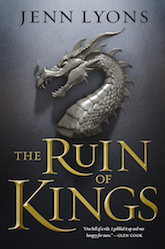

The Ruin of Kings (The Godslayer Cycle)
 Jenn Lyons lives in Atlanta, Georgia with her husband, three cats, and a nearly infinite number of opinions on anything from mythology to the correct way to make a martini. Her debut epic fantasy novel, The Ruin of Kings, is scheduled for release from Tor Books on February 5, 2019.
Jenn Lyons lives in Atlanta, Georgia with her husband, three cats, and a nearly infinite number of opinions on anything from mythology to the correct way to make a martini. Her debut epic fantasy novel, The Ruin of Kings, is scheduled for release from Tor Books on February 5, 2019.










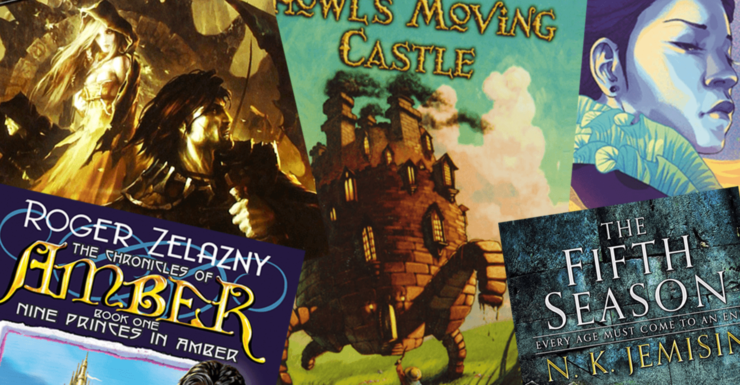
I asked Max about his city designs; Dresediel Lex is a combination of LA, Mexico City, and Beijing (which has almost completely depleted its water table).
“If a wizard wasn’t changing themselves…” ?? Oy
How about Sir Isaac Newton, from Greg Keyes’s Age of Unreason? He figured out how alchemy worked, which caused all kinds of problems.
Of course, his apprentice, one Benjamin Franklin, surpassed his master in many ways.
God preserve me from knee-jerk PC reactions but the white, western characterization of the supposed center of the universe and source of all realities bothers even me. I push it aside but I notice.
Yay Amber! First adult fantasy I read where the hero has a sense of humor (“Out of each life some blood must spill, and it was my turn” “of all my relations I like sex the best and Eric the least”).
Oh yes, Corwin is a joy to read. And his siblings are almost as snarky. Especially Random; ‘While sex heads a number of lists all of us have things we like to do in between’.
I thought that the moontide quartet also offered some enjoyable epic mage/wizard stuff :) And ofcourse Pug is overpowered as hell in the end. Oe and Icarium from malazan, epic as f*****ck :)
Hey, can I just say that’s my art on Nine Princes In Amber and you made my day by using it! (I did the other 4 Corwin e-covers too) Thanks!
Gary McCluskey
Belgarath, Belgarion, and Polgara from the Belgariad and Malleoreon series by David Eddings.
Thanks for reading my musings.
AndrewHB
If you made a movie (or, better, a TV series) our of the Amber books, the redheads would need to be convincing redheads, so they should probably be played by white people. Corwin has managed to blend in with European populations since the plague, so he likely should be played by someone white, too. But, in this family of half-siblings whose mothers are often from different worlds, there’s no reason the others should be. Even in the full siblings, when there are shapechangers in the family tree and even basic chemistry doesn’t work the same from world, there’s no compelling reason why DNA should work the way we expect it.
@8, Nice cover art! That’s not how I pictured Corwin, but I have no problem recognizing him and the covers actually reference what happens in the books. That is so rare! Love the basket hilted Grayswandir.
Wiz Zumwalt from the Wiz Biz series (which starts with Wizard’s Bane).
If a wizard is so powerful he/she can create the great change needed in his/her world, the writer would be foolish to make the wizard the main character. Boring! If the world is mainly wizards, then the apprentice wizard Chosen One is the best way to go. If the writer goes with a nonmagical or not so powerful character, then there’s always a Dumbledore or Merlin acting as the puppet master.
I’ll add Anomander Rake from Erikson Malazan series. There is one who has power and can change into a dragon.
Harry Dresden might fit. While not exactly being able (yet) to create a universe even he states that he has a LOT of magical raw power. Not that much finesse and he’s still young. Add in *spoilers* the fact that he wiped out an entire Court of vampires, the mantle of the Winter Knight and access to a fallen angel *end spoilers* and I think he qualifies.
I’d say Wynne Jones’ Chrestomanci also qualifies.
Would Mistborn qualify as wizards?
Tanya Huff wrote some stories about Magdelene, the most powerful wizard in the world. There’s nothing she can’t do, but she has no ambition, doesn’t care much about power and would rather be left alone to relax in the sun.
I totally understand WHY in a story things are the way they were, but I laughed out loud at your description of Saruman.
If we are bending the rules a bit, I feel like Nyneave, Egwene and Moirane are all pretty high powered ‘wizards’ who do some pretty cool stuff. The Star Wars EU also has some pretty hyper powered Sith lords/alchemists.
Yay, @9, and I also love the Magdelene stories by Tanya Huff, @17. Also, I can’t stop laughing over the “sexy lamp” line.
Dave Duncan’s “A Man of His Word” series, and the sequel “A Handful of Men”. In those, the standard address towards a wizard is “Your Omnipotence”. And they deserve it, too.
I’m surprised to not see Raistlin in all his ambitious glory anywhere amongst these comments.
Pug / Milamber was pretty powerful, if I’m not mistaken he was the avatar of the god of magic or something like that
The Belgariad and Malleoreon series by David Eddings, absolutely, as someone said above. I’ll forever scoff whenever that series is mentioned, for exactly that (cartoonish) reason.
Re 21, Raistlin was mentioned in the article’s closing comment. I’m still impressed with what I remember about him, but I’m definitely never going back to re-read Dragonlance and find out how wrong I was.
Lump Allanon alongside Gandalf and company, for his primary power being to launch the hero on his quest.
Malazan got it right. I was feeling exasperated through the first book, but after things became more clear I was all onboard. Fabulous powers spewing everywhere, no holding back, and still no easy victories.
In Jo Clayton’s Duel of Sorcery, a single wizard is trying his hand at breaking the world because he’s bored. He’s not the protagonist, though. His former … student is way too positive… involuntarily drafted living laboratory apparatus is. She mainly does life magic but by the end of the book she branches out.
I think Harry Dresden fits. He didn’t at first, but he’s gaining more powers with every book and by the end of the series, if it’s ever written, I’d expected him to be god-level or better in what he can execute.
Doesn’t LeGuin’s Ged fit? He breaks the boundaries between life and death.
@25 agree about the Wizard of Earthsea. Plus he had a cool theme song.
Let me tell y’all a story ’bout a man named Ged
A poor Gontishman barely kept his buddies fed
Then one day he tried to impress folks with a spell
He kinda messed it up and opened up a gate to Hell
The work of Lawrence Watt-Evans features many hyper-powerfull magic users, some of whom can levitate enormous buildings or animate immortal and invulnerable stone dragons hundreds of feet long.
ALL the wizards of Young Wizards, by Diane Duane, have this potential.
Because wizardry is wrapped inextricably with a pretty strict code of ethics, we haven’t seen a bad wizard yet (with one exception who largely doesn’t do much), but our Good Guys do some badass stuff like steal molten iron from a newborn star’s core or create a tidal wave out of all the water on Mars to save their BFF.
Add SOURCERER by Terry Pratchett, which deconstructs the whole genre of super-powerful wizard books.
@29 I was just coming down here to add that one. The wizards in the rest of Discworld aren’t that impressive, and in Sourcery we learn exactly why that is.
I’ll also agree with a couple above commenters that the wizards in Malazan are pretty Earth shattering.
Funny thing is, I was always disappointed by wizards whose powers were essentially unlimited. Because if the wizard was all-powerful, there was no story. Just, ‘something bad happened, but the wizard fixed it. The end.’ If they weren’t, as you say, “hamstrung in some manner to explain why they didn’t automatically win” then there was no conflict, no anticipation, no sense of triumph at the inevitable resolution. You said that about the villains, of course, but it also applies to the heroes. So then you achieve conflict by throwing in an equally all-powerful opponent. Yawn. Two people who are way out of my league fight. Just another story I don’t get to be in. If I think I can identify with the protagonist, then I’m lying to myself. The sole job of anyone I can relate to is to hope they don’t get killed in the crossfire. Most of the badass stuff the characters are doing is so over-the-top I can’t force myself to suspend disbelief, or in some cases, even figure our what it is they think they’re doing, let alone why it’s supposed to be a good idea. Which is why I’m not hugely behind you on most of your choices.
I always enjoyed Nathaniel, the… complex young wizard at the heart of the Bartimaeus Trilogy. Add in Solomon, from The Ring Of Solomon (the 4th book in the series) as well. The cost these wizards pay to control unbelievable power is a terrific read. Add in the snark of Bartimaeus himself, and this series is perfection.
Re “by the end of the book she branches out” — that is so bad!
I think Patricia A. McKillip’s Riddlemaster series could be considered in this topic. Shape-changing, mind-blow, earth-shaking, dead-raising, great-shoutingingly good books.
Like most older tales for children, The Wizard of Oz is a cautionary tale. Everyone Dorothy meets has their own agenda and either openly or covertly has a plan to use Dorothy for their own gain. Dorothy has her own agenda. Glenda, the good witch, is exactly like Dumbledore as both use a child as an unwitting combatant and neither tell the child what is actually going on. TWOO is more direct in its lesson as Dorothy learns that only in one’s home can one hope to not be used by others. Interestingly, Dumbledore recruits Potter who has no home and knowingly puts Potter in an abusive home so Potter does not have any place he can trust. Potter cannot go home as Dumbledore actively denies Potter a home.The Potter series is a fascinating exploration of class struggle by Rowling who has shown herself to actually dislike common people if they don’t know their ‘place’.. Rowling isn’t for equality , she just thinks the wizards should be subtle about how they use the commons .
Tolkiens Gandolf is is a story of the limits “good” places on power. The evil wizards can wield more power because good by definition is a restraint on the use of power. The lesson of Tolkien is that good is a force created by joining others while evil is individually powerful. The wizards/Jedi of Star Wars have the same lesson that those on the Dark Side continually talk that those on the light side cannot know the power of the Dark side. So, the wizards of both stories spend their time creating a joined group who have good power in their group but no one of the good can actually compete in power with the individual who has embraced evil.
Potter is a dupe to the end. At no point does Potter ever become more than a foot soldier who gets told just enough to continue fighting.
I agree with #18 about Nyneave, Egwene, and Moirane. I’d add in Rand, though. ;) I’d also add Trisana Chandler from Tamora Pierce’s Circle of Magic series, as well as Jaenelle Angeline, Daemon Sadi, and Saetan SaDiablo from Anne Bishop’s The Black Jewels series.
Ah, reading this thread just makes me want to curl up with the original Amber series and a bucket of Kentucki Fried Lizard Partes.
David Eddings The Belgariad, The Malloreon series and The Elenium, The Tamuli series.
Raymond E Feist, The Magician series.
Should be in this list!
The other Glen Cook
The Dread Empire.
I’d include the Knights of the Word. Incredible power, but finite. You will need it more in the future, but that means letting the people around you suffer now.
The wizards of Jack Vance’s Dying Earth (as shown in Rhialto the Marvelous in particular) do some truly remarkable things, at least when they can be bothered.
yeah but Raistlin was cool. Loved the Chronicles of Amber. Terry Goodkind’s Sword of Truth series should be here. Pug is amazing!!! I think we shouldn’t forget Elminster either. What about Elric? His power wasn’t all in his sword.
@35/Siempre44: “Rowling […] has shown herself to actually dislike common people if they don’t know their ‘place’.”
Huh? Rowling criticised class divisions in The Casual Vacancy.
Some good choices, but you need to add the Darkover series from Marian Zimmer Bradley. Some really powerful planet affecting magic is woven into that series.
Ridiculous degrees of power (and the general arbitrariness of magical powers) are why I tend to shy away from fantasy, and for that matter have not bothered with any of the recent superhero movies. I just find it annoying when the hero or some wizardly helper pulls some new magical solution out of his hat. Also annoying when the young poor person who is actually a secret prince or princess develops unprecedentedly vast powers pretty much every third page or at worst every third chapter. (Oh and by the way I am sick to death of royalty. I only want to read about royalty when its purpose in the story is to show how noxious the idea of royalty is.)
I agree with commenter 31, Michaele Jordan: infinite or quasi-infinite power is boring. Our guy wins. Obviously. What took so long.?
I do read some fantasy; good writing and strong characterization can redeem a lot of implausibility. But even then I totally disagree with the writer’s impatience with constraints. If there are no constraints magic is just stupid. C.J. Cherryh and Lois McMaster Bujold both write fantasies that I enjoy – they are both masters at world- and character-building, and they both provide strong and consistent constraints on their characters powers.
The Kedrigern series by John Morressy features a protagonist who is a competent wizard (although not earthshaking). It’s also very funny. Unfortunately it’s not easy to find these days.
Half in Graydon Saunders Commonweal series is another candidate for this list, she’s been dead twice (at least?) , and stuff tends to just get out of her way.
If you are going to talk Amber, Merlin was far more the wizard then Corwin, between always having a fun spell on hand, and the creation of Ghostwheel, he plays the role of mage past just using the family knacks.
I just finished the last book in Michael Manning’s Mageborn series, and am happy to see there are a bunch of new ones ahead from separate series.That boy is a serious Archmage who messes up just often enough to keep his magics off kilter to span the whole series. How can that be left out?
Small magic can have as much of an impact as powerful magic, it can be just as beautiful. The real secret is the attitude of the one wielding it. If a wizard acts as if anything is possible then it usually becomes possible.
While Howl is one of my favourite wizards, another more ridiculously powerful wizard I like is Max from The Labyrinths of Echo series. Max’s power seems to grow with every book so that at a point he even can create alternate worlds of his own. It is a funny series though some of the humour doesn’t translate well from the Russian.
I am glad to find someone mentioned pug so I didn’t have to. Many were the hours I laid in bed after being bullied in middle school thinking about what I would do to people if I had pugs power. Wouldn’t be to far off the mark to say that pug got me through middle school.
I am also interested in the hate for the Dragonlance books…my first reaction is that it is some political protest thing…but I try not to prejudge. I mean sure they are not nearly as good as well – any other fantasy. But for D n D books they are pretty good.
I tried to read the black company but wow was there a lot going on I didn’t understand. Was all interesting but it was definitely starting in the middle.
I am going to stay far away from the revisionist take on Harry Potter except to say two things (1) I didn’t see any evidence in the books that Dumbeldore knew the household was going to be abusive (2) When she became famous and rich Rowling could have left for the U.S. to avoid British taxes. People expected her to do so and asked when she was going to do so. She not only said she wasn’t going to – and has lived up to that promise – she berated the expectation that she would. She did not have to do either of these things.
@43: even within the Potterverse, @35 has it upside down; all of the mages who despise part-“Muggle” characters are villains of some degree. And as for Dumbledore not telling Harry enough; among other things, the idea that a child can just randomly take on the burden of saving the world is one of the most improbable ideas I see in fantasy, no matter how popular it is.
For power and its consequences, see The Magician (aka Trav) in the Liavek shared-world books (edited by Bull and Shetterly in the 1980’s). He is massively (and ingeniously) powerful, but has a couple of weaknesses (starting with a heart) that the enemy empire can use, has a door guard who makes sure he isn’t bothered for trifles (when his door is in this world at all) and is suicidally bored with power by the last book. IMO these are among the very few shared-world books worth rereading.
(afterthough) It occurs to me that a fatal weakness (that makes stories possible) is not incompatible with being a hugely powerful wizard; cf Koschei and the heart he has hidden far away. That’s not the only way to get out of the boredom of a wave-of-the-wand fixing (or breaking) everything, but there are ways that huge power doesn’t break a story.
@50 Small magic makes me think of Samarkar-la in Elizabeth Bear’s Eternal Sky series.
Michael Moorcock’s The Dancers at the End of Time series has characters who are indistinguishable from all-powerful magicians who literally create the universes/dimensions they exist in
Rand Al’Thor
Sethra Lavode would count, but she isn’t a main character for most of Brust’s books.
I know everyone’s moved on, but I’m still thinking of Amber. I was watching Infinity War last night and thought how Idris Elba would make a fantastic Corwin. Sure, Erik dropped him off during the Black Death, but the plague was in Africa. Also, Erik just wanted to dump the body. He didn’t care about local politics and ethnic issues. He just asked for a shadow where he expected Corwin to die without attracting notice.
I totally agree with all those who mentioned the David Eddings books here. While the Belgariad, at least was an enjoyable read, the Mallorean and subsequent novels by this author were carbon copies of the Belgariad. Different names, same thing. Of course, I also agree with Rand al’Thor and other WoT characters mentioned, though I’d add the Forsaken to the list–they had all the knowledge.
I can’t remember his name–it began with an ‘M,’–but I’d include the “good guy” wizard in Jaqueline Carey’s Godslayer series, he was already super powerful but after being lost in pursuit of the protagonist, returns even more powered up than before.
To my eye, magic has changed a lot since I was a kid (47 now). Brandon Sanderson has a gift for creating new magic systems, but most make the user way too powerful. Like Szeth in the Stormlight Archive, or Vin in the Mistborn books, and her neutered buddy who only becomes a GOD…(now if only he could use the CTRL-F function on his word processor to discover and use adjectives for the word “said”…just because it was good enough for Tolkien…and btw, Jordan never once called anyone a “channeler”)
Also worth mentioning are Gavin Guile, Kip Guile, Andross Guile and the White King from Brent Weeks’ Lightbringer saga, each of whom is pretty damn powerful in their own right. Kylar Stern from his other series also.
Hell, a whole pile of books could make this list.
The article author isn’t the only one to question Glinda’s competance. Hence all the fan-cannon (at least I think it’s fan cannon, I haven’t read all 26 of the Oz books) that paints her as a stone-cold manipulator that tricks a teenage girl into become an assassin to eliminate her rivals (Witches of the East and West, plus the Wizard of Oz).
The problem with all-powerful wizards is essentially the same as superheroes. Where does the dramatic tension come from? So you have code of ethics (like the wizard in David Weber’s War God’s Own), secret identities (how do I resolve this without compromising my chance to have a normal life – see Belgarath and his brotherhood) and fundamental weaknesses (like the aforementioned Heart).
@62,
Not even God can write a workable story about all-powerful wizards. :)
@63/Keleborn – I don’t know, he legends surrounding King Solomon (Son of David) make him sound pretty close to all-powerful… :)
@64/WillMayBeWise,
There’s a possibly interesting distinction to be made there between being either all-wise or all-powerful. An all-wise person must still conform to the laws of physics. Unless of course she (or he) is wise enough to have discerned what the real laws of physics are.
I am reminded somehow of the female character (name?) in Ringworld who had been bred to be incredibly lucky. Sort of a “third way”.
@65/Keleborn — that was Teela Brown, and in Ringworld Engineers it turned out that being incredibly lucky wasn’t all it was cracked up to be …
@65/Keleborn – well, yes. We *might* be getting confused about Solomons. There’s a number of them in the Bible. I’m not a bible scholar, and the on-line resources get murky, so I’m not sure what qualifies as Biblical, Apocryphal and what’s simply “just” mythology. I’m pretty sure if I get any of this wrong there’ll be someone more knowledgeable to correct me. ;)
I’m working under the assumption you have Solomon the Wise, First of his Name, King of Israel, in mind. He’s famous for (amongst other things) threatening to chop a baby in half and separating the Judiciary and the Executive arms of government (not joking – the Bible describes an organisational chart of his governmental system). He’s succeeded by Solomon the Second, noted warrior and war leader, but really only remembered as being without sons and being a doddering old man when Goliath turns up. The shepherd and child-soldier David obviously deals with the big guy, and matured into a noted warrior and general. Solomon II appoints him his heir (possibly after David marries his daughter). David names his son Solomon, and it’s Solomon III I’m thinking of (I think).
This Solomon prays humbly to God for knowledge. As a reward for not asking for riches or power, God grants him knowledge of the arcane, which gives him dominion over the land, sea and sky. It also gave him dominion of devils and demons. The Seal of Solomon was a ring he forged to symbolise this, and is also the name of an arcane glyph (a circle enclosing his father’s emblem, the Star of David) used to bind demons. Among the many demonstrations of his power: beasts of the field and forest were said to walk into his palace kitchens ready for slaughter; he would travel about on a 60 foot square flying carpet; and the Great Temple of Jerusalem was said to have been built in a single night by demons at his command. It gets a bit vague about the limits of his power, so I’m thinking he qualifies as an “All-Powerful Wizard”.
On race and Amber – in the second series, we find out that the Amberites are all, in theory, as children of Chaos, capable of becoming shapeshifters. With that in mind, I see now reason we couldn’t have Idris Elba as Corwin and Mark Strong as Eric or something like that, despite them being full brothers. (For the old Amber RPG fans, I also point out that we are never told Corwin *isn’t* a talking bear…)
I love Amber deeply, but it’s the gender stuff that makes it hard to recommend to a contemporary reader. Zelazny catches up somewhat in the Merlin books, but the Corwin books, while brilliant and very readable, are now in the “these books are great, but consider that they’re old and do not manage to rise above the bad gender politics of the era”.
@67/WillMayBeWise,
My goodness, I somehow gave you the impression I knew what I was I was talking about.
My knowledge of the Bible is limited to a book called “Bible Stories” (read as a child during visits to the Dentist’s office, remembered only impressionistically); the gospels Luke and Matthew (College History of Consciousness class); the Madonna song “The Beast Within” (adapted from Revelations, God only knows how faithfully); and my knowledge of King Solomon limited to the “Lord Garth” Star Trek TOS episode in which Kirk says to Spock that letting himself get hit on the head was not a method of which King Solomon would approve.
Yet the distinction between either all wise or all powerful is still an interesting one, is it not? Not much use having power if you’re going to use it in ways that are stupidly self-destructive. Whereas being wise can make you an effective leader, and a few other things besides.
I would have thought being incredibly lucky would be best of all (analogous to having “plot armor”), but apparently RingWorld Engineers revealed that’s not the case (thanks to @66/hoopmanjh).
I think Will is confusing the names Solomon and Saul. Saul was the first King of Israel and David’s predecessor. There’s only one King Solomon in the Bible. But I’m also pretty sure that the stories of him having magical powers are non biblical traditions.
@69/Keleborn — Spoilers for Ringworld Engineers, a 30+ year old book:
The problem is that while Teela is incredibly lucky, her “luck” is actually in service to the even-luckier incredibly lucky people in the future; and if their “luck” requires Teela to a) go on an incredibly dangerous journey to the Ringworld and b) be turned into a Pak protector so that she can repair the Ringworld so that it’ll be conveniently available for lucky people who need it 10,000 years hence, well, them’s the breaks.
@71/ hoopmanjh,
Can you breed for that? :)
Never mind, I should probably just read the novel again. Which I did, fairly soon after it was published, only I don’t remember any of it.
@71/hoopmanj – now you mention it, I remember. That was a harsh fate.
@70/PrincessRoxana – well, curses. I always thought there were many Solomons. I would have thought a successful king would have had successors named after him. <shrugs>
so the magical stories aren’t in the Bible. Did I get it right about the stuff that was in the Bible?
@72: As I recall (long story short), Teela was the product of several generations of people who only existed because their parents had won a lottery that would allow them to have a child. So her very existence was the result of many generations of probability working in her favor.
(Which yes, even when I was reading the books when I was in high school I could see the fundamental silliness of the concept.)
Apparently Suri (in Sullivan’s ‘legends of the first empire’) is now eligible for this list. The first paragraph in Age of War covers it nicely :o
Sorry no quote – definitely a RAFO.
@75,
I thought the concept of breeding for (or selecting for) luck that way was hilarious. And after all, people do talk about luck as if it was something that actually existed. In that case, why wouldn’t it have a genetic component?
I once came across in a dictionary of mathematical terms the word “lottery” and the definition “game created to make money off of people who can’t understand mathematics”.